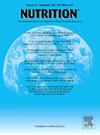Healthful plant-based diet and incidence of hypertension in Brazilian adults: A six-year follow-up of the CUME study
IF 3.2
3区 医学
Q2 NUTRITION & DIETETICS
引用次数: 0
Abstract
Background
Studies demonstrate that consuming plant-based diets has beneficial effects on several health outcomes. However, the evaluation of the healthiness of plant-based diets and the incidence of hypertension has still been little explored in the literature. Objectives: Thus, this study aimed to evaluate the association between plant-based diet indices and the incidence of hypertension in Brazilian adults and test whether the interaction between hPDI, sociodemographic, and lifestyle variables modifies this association. Methods: This longitudinal study included 3192 (F = 2125, average age 34 years) participants from the Cohort of Universities of Minas Gerais (CUME Study, Brazil, 2016-2022). Dietary intakes were assessed using a validated food frequency questionnaire. We measured three plant-based diet indices: overall plant-based diet index (PDI), healthful plant-based diet index (hPDI), and unhealthful plant-based diet index (uPDI). Participants were classified as new cases of hypertension if they were free of this disease at baseline, had a systolic blood pressure ≥ 140 mmHg, a diastolic blood pressure ≥90 mmHg, were using antihypertensive medications, or had a diagnosis of hypertension by a physician in at least one of the follow-ups. Crude and adjusted Cox regression models were used to evaluate the relationship between plant-based diet indices and hypertension incidence and a multiplicative interaction was tested. Results: The incidence of hypertension was 19,8/1000 person-years total. The mean follow-up time was 3.36 years. There was an inverse association between the highest quintiles of hPDI (HR = 0.56, 95% CI = 0.37–0.86; HR = 0.55, 95% CI = 0.35–0.88) and hypertension. In subgroup analysis, inverse associations between hPDI and hypertension risk were stronger in participants who were insufficiently active and overweight (p-interaction < 0.05). Conclusion: Greater consumption of healthful plant foods, reduced consumption of animal-source foods, and less consumption of unhealthful plant foods are important for hypertension prevention in the Brazilian population.
健康植物性饮食与巴西成年人高血压发病率:CUME研究的六年随访
研究表明,食用植物性饮食对几种健康结果有有益影响。然而,植物性饮食的健康和高血压发病率的评估在文献中仍然很少被探索。目的:因此,本研究旨在评估巴西成年人植物性饮食指数与高血压发病率之间的关系,并测试hPDI、社会人口统计学和生活方式变量之间的相互作用是否改变了这种关系。方法:这项纵向研究包括来自米纳斯吉拉斯州大学队列的3192名参与者(F = 2125,平均年龄34岁)(巴西,2016-2022)。膳食摄入量通过有效的食物频率问卷进行评估。我们测量了三种植物性饮食指数:总体植物性饮食指数(PDI)、健康植物性饮食指数(hPDI)和不健康植物性饮食指数(uPDI)。如果参与者在基线时没有高血压,收缩压≥140 mmHg,舒张压≥90 mmHg,正在使用降压药物,或在至少一次随访中被医生诊断为高血压,则将其归类为新发高血压病例。采用粗糙和调整后的Cox回归模型评估植物性饮食指标与高血压发病率之间的关系,并进行乘法交互作用检验。结果:高血压总发病率为19.8 /1000人年。平均随访时间为3.36年。hPDI最高的五分位数之间呈负相关(HR = 0.56, 95% CI = 0.37-0.86;HR = 0.55, 95% CI = 0.35-0.88)和高血压。在亚组分析中,在运动不足和超重的参与者中,hPDI与高血压风险之间的负相关更强(p-interaction <;0.05)。结论:多吃健康的植物性食物,少吃动物性食物,少吃不健康的植物性食物对巴西人预防高血压很重要。
本文章由计算机程序翻译,如有差异,请以英文原文为准。
求助全文
约1分钟内获得全文
求助全文
来源期刊

Nutrition
医学-营养学
CiteScore
7.80
自引率
2.30%
发文量
300
审稿时长
60 days
期刊介绍:
Nutrition has an open access mirror journal Nutrition: X, sharing the same aims and scope, editorial team, submission system and rigorous peer review.
Founded by Michael M. Meguid in the early 1980''s, Nutrition presents advances in nutrition research and science, informs its readers on new and advancing technologies and data in clinical nutrition practice, encourages the application of outcomes research and meta-analyses to problems in patient-related nutrition; and seeks to help clarify and set the research, policy and practice agenda for nutrition science to enhance human well-being in the years ahead.
 求助内容:
求助内容: 应助结果提醒方式:
应助结果提醒方式:


